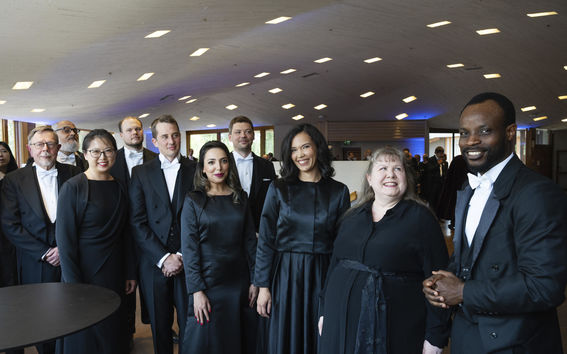Doctoral graduates of Aalto University in working life
Skills learned during doctoral education are valuable in working life

The skills of doctors of art and design, economics and business administration, and technology range from solid expertise in their field to a command of the bigger picture.
‘Doctoral graduates can tackle new issues, as well as search for and analyse information and process it to be used in decision-making. They are at a great vantage point with regard to the latest research, and get the courage to tackle problems to which no solutions are yet available’, says Margit Suurnäkki, Head of HR, KONE Technology & Innovation.

Internationalisation is routine at Aalto University and every year, a large number of top foreign experts in Finland graduate with a doctoral degree, giving them access to the Finnish work sector.
Even a global elevator manufacturer like KONE has a need for doctoral graduates with an international background, who will bring their expertise and diverse networks with them to the work community.
‘Through their basic studies, they have the experience and the networks from their home country, but they are also part of the Aalto science community, which in itself is very international. This is extremely valuable to us’, Suurnäkki says.
Alessandro Mancuso's PhD, which he has completed as a double degree at Aalto University and Politecnico di Milano, will be conferred to him after the public defence of his doctoral dissertation. Originally from Italy, he first came to Finland for his master's thesis, as a part of which he completed three months at Aalto University. This brought about an opportunity for doctoral studies.
‘I decided to move to Finland because I value international experiences for my personal growth and career opportunities and to be honest, the salary paid for the doctoral research was also pretty good’, Mancuso says.

For his dissertation, Mancuso developed a framework to analyse the failure risks of safety-critical systems by focusing on the overall system instead of individual components.
After completing his doctoral studies, he had an open mind about working abroad, ‘I considered jobs anywhere in Europe, but mainly in Italy, Finland and the UK. In the end, I chose between KONE and another major Finnish industrial company, both of which offered me a job. My choice was KONE, with Hyvinkää as my primary working location’.
When applying for a job, Mancuso found that employers valued doctoral studies very highly, ‘In Finland, a doctorate opens many doors to the industry. It is different in Italy, where doctoral studies are mainly seen as a route to an academic career and professorship’.
As a business analyst at Kone, Mancuso develops solutions that improve the maintenance process of elevators and escalators in different stages.
‘With my doctoral studies, I extensively developed my skills in critical thinking and problem-solving. One of the main differences between master and doctoral studies is the ability to look ahead at future challenges and develop solutions for as yet unsolved problems. Creativity and scientific rigour are key factors in succeeding with doctoral studies, and its many subsequent career opportunities’.
Mancuso also urges doctoral students to leverage the networks of their professors and other specialists in the industry. Doctoral studies are also an excellent way to improve presentation skills, which come in handy at university seminars, at international conferences or in teaching duties.
‘Being able to explain complex ideas to students who have never heard of the topic before, on the one hand, and to distinguished experts in the field on the other is demanding. I did not have this kind of opportunities during my bachelor and master studies, but as a doctoral candidate, I practised it a lot. Presentation skills are extremely valued in any career path’, Mancuso says.
Mariana SalgadoA doctoral degree from a Finnish university makes you a valued expert.
‘Argentinians admire Nordic design. And if design in Finland is of such a high standard then education in the field must also be good’.
This is how Mariana Salgado reasoned to herself 20 years ago when she packed her suitcases in Buenos Aires to start her studies at the University of Art and Design Helsinki in Finland. She had graduated with a degree in industrial design from the University of Buenos Aires. In her new home country, she graduated with a master's degree in art and design in 2002, and with a doctorate in art and design in 2009.
For her doctoral dissertation, Salgado studied how interactive design can be used to lower the threshold for visiting museums. She studied the museum experience, using her interactive works at Ateneum, the Design Museum and Kunsthalle Helsinki.

‘My time during my doctoral studies was amazing. I was able to conduct independent research in a very inspiring environment and it was wonderful to work at a university where people give their best to their work’, Salgado says.
Salgado currently works at the Ministry of the Interior of Finland in different innovation and strategic projects. As a service designer in the administration and development department, she contributes to the development of new services, processes and public policies. Her work is pioneering as only two service designers are working in the entire Council of States.
As someone who comes from outside Europe, Salgado believes she provides teamwork with new and different perspectives. ‘As a non-European female worker, it is good to carry a doctoral degree, because it allows me to be more competitive in job hunting. A doctoral degree from a Finnish university makes you a valued expert’, Salgado says.
At the Ministry of the Interior, Salgado only uses Finnish in her work, however she started to learn the language only after she arrived in Finland. ‘I could have managed with English when I was preparing my doctoral dissertation, but life in Finland would not have been so nice without knowing any Finnish. As a person, I am so sociable so I could not imagine living here without knowing the language of the country’, Salgado explains.
It was not easy for her to learn the language either, ‘Still, I urge all foreign master's and doctoral students coming here to learn Finnish. It helps you integrate and widens your job opportunities’.
Salgado loves meeting new people, ‘I network actively and in my free time, I produce a podcast for public-sector designers. As a result, I have been invited to many countries in South America, and Europe’, Salgado says happily.
Margit Suurnäkki also regards building networks as important, even during studies, ‘Although you work under a lot of pressure when you prepare your doctoral dissertation, you should reserve time for meeting people and having discussions’.
Even though the working language of global work teams is commonly in English, knowing the local language brings many kinds of joy and benefits. ‘At KONE, I have been able to work abroad and found that language is the key to the local culture. When you are part of a work team, it is nice to understand at least some of the local language. It helps you network within and outside your work community’, Suurnäkki says.
Text: Marjukka Puolakka

Skills learned during doctoral education are valuable in working life

Our six doctoral programmes offer high quality doctoral education within a multidisciplinary international research community. They prepare doctoral students for demanding academic careers and experts positions, and for working as entrepreneurs or independent artists.

Doctoral studies pave the way for self-development and research geared toward solving practical problems. What companies get out of PhDs are multidisciplinary experts who are not afraid to tackle major challenges.

Research collaboration with Aalto starts often from a single project but it may also develop into a long-term strategic partnership.